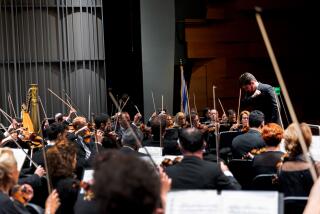Vakhtang Jordania, 62; Major Soviet Conductor Whose Star Dimmed in U.S.
- Share via
Vakhtang Jordania, a prominent Soviet conductor whose post-defection career in the United States never matched his early renown, died Tuesday at his home in Broadway, Va. He was 62 and had cancer.
Jordania won the top prize at the 1971 Herbert von Karajan competition for young conductors in Berlin. Conductor Yevgeny Mravinsky chose him to be his assistant at the Leningrad Philharmonic Orchestra for three years, and other prestigious assignments followed as guest conductor with nearly all major orchestras in the Soviet Union and Eastern Europe.
Because of a Soviet rule that prohibited performances in the West, he left his family in 1983 to defect with his then-girlfriend, violinist Viktoria Mullova. They won asylum in the United States.
He toured as a guest artist from England to South Korea before taking appointments as music director of the Chattanooga Symphony and Opera (1985 to 1991), then at the Spokane Symphony in Washington state (1991 to 1993).
In Chattanooga, he was credited with enlivening the small orchestra with first-class visiting musicians, including violinist Itzhak Perlman and flutist Jean-Pierre Rampal.
After Spokane, he settled in Virginia and started a busy freelance career. He recorded several well-received classical albums and was honored with a conducting competition named after him in Ukraine.
Jordania was born in Tbilisi, Georgia, on Dec. 9, 1942. A piano student as a boy, he decided on a conducting career at age 9.
After graduating from the Tbilisi Conservatory, he studied symphonic and operatic conducting at the Leningrad Conservatory.
During his Soviet career, he became conductor of the Kharkov Philharmonic Orchestra in the Ukraine. He was conducting 100 concerts a year by the early 1980s.
Though he lived in relative luxury, he bristled at state-imposed restrictions. He met Mullova when he was asked to prepare her in 1980 for the Jean Sibelius violin competition, which she won.
Over time, they spoke increasingly of defecting. He and Mullova won KGB approval for a summer tour of Finland in 1983, with Jordania doing a rare turn on piano accompaniment.
As she later told the Washington Post, she won accolades but he was drubbed for his piano work. She said she asked the KGB chaperon to leave them alone because Jordania was “very depressed” by the reviews.
The pair then took a taxi across the nearby Swedish border and flew to Stockholm, where they gained political asylum.
That November, Jordania was engaged at Carnegie Hall conducting the American Symphony Orchestra, but he otherwise had to scramble for work, taking conducting jobs from Alabama to Australia.
His first two marriages, to Nana Askurava and Natalia Bondarchuk, ended in divorce.
Survivors include his wife of 18 years, Kimberley Stebbins Jordania; four children from his three marriages; two brothers; and four grandchildren.
More to Read
The biggest entertainment stories
Get our big stories about Hollywood, film, television, music, arts, culture and more right in your inbox as soon as they publish.
You may occasionally receive promotional content from the Los Angeles Times.










